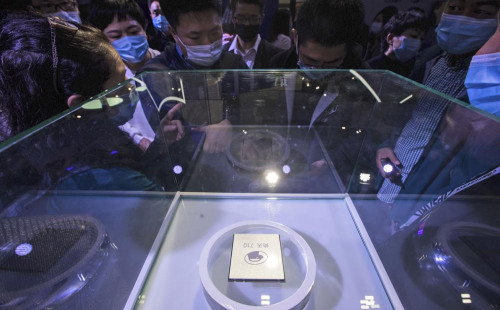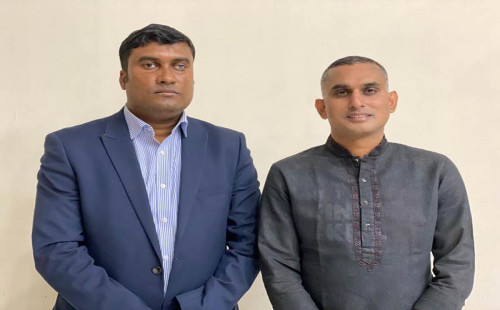China pursues tech ‘self-reliance,’ fueling global unease

To help make China a self-reliant “technology
superpower,” the ruling Communist Party is pushing the world’s biggest
e-commerce company to take on the tricky, expensive business of designing its
own processor chips — a business unlike anything Alibaba
Group has done before.
Its 3-year-old chip unit, T-Head,
unveiled its third processor in October, the Yitian 710 for Alibaba’s cloud
computing business. Alibaba says for now, it has no plans to sell the chip to
outsiders.
Other rookie chip developers
including Tencent, a games and social media giant, and smartphone brand Xiaomi
are pledging billions of dollars in line with official plans to create
computing, clean energy and other technology that can build China’s wealth and
global influence.
Processor chips play an increasingly
critical role in products from smartphones and cars to medical devices and home
appliances. Shortages due to the coronavirus pandemic are disrupting global
manufacturing and adding to worries about supplies.
Chips are a top priority in the
ruling Communist Party’s marathon campaign to end China’s reliance
on technology from the United States, Japan and other suppliers Beijing sees as
potential economic and strategic rivals. If it succeeds, business and political
leaders warn that might slow down innovation, disrupt global trade and make the
world poorer.
“Self-reliance
is the foundation for the Chinese nation,” President
Xi Jinping said in a speech released in March. He called for China to become a “technology
superpower” to safeguard “national
economic security.”
“We must
strive to become the world’s main center of science and the
high ground of innovation,” Xi said.
Beijing might be chasing a costly
disappointment. Even with huge official investments, businesspeople and
analysts say chipmakers and other companies will struggle to compete if they
detach from global suppliers of advanced components and technology — a goal no
other country is pursuing.
“It’s hard to
imagine any one country rebuilding all of that and having the best technology,” said Peter
Hanbury, who follows the industry for Bain & Co.
Beijing’s campaign
is adding to tension with Washington and Europe, which see China as a strategic
competitor and complain it steals technology. They limit access to tools needed
to improve its industries.
If the world were to decouple, or
split into markets with incompatible standards and products, U.S.- or
European-made parts might not work in Chinese computers or cars. Smartphone
makers who have a single dominant global operating system and two network
standards might need to make unique versions for different markets. That could
slow down development.
Washington and Beijing need to “avoid that
the world becomes separated,” U.N. Secretary-General Antonio
Guterres told The Associated Press in September.
China’s factories
assemble the world’s smartphones and tablet computers
but need components from the United States, Europe, Japan, Taiwan and South
Korea. Chips are China’s biggest import, ahead of crude
oil, at more than $300 billion last year.
Official urgency over that grew
after Huawei Technologies Ltd., China’s first
global tech brand, lost access to U.S. chips and other technology in 2018 under
sanctions imposed by the White House.
That crippled the telecom equipment
maker’s ambition
to be a leader in next-generation smartphones. American officials say Huawei is
a security risk and might aid Chinese spying, an accusation the company denies.
Huawei and some Chinese rivals are
close to matching Intel Corp., Qualcomm Inc., South Korea’s Samsung
Electronics and Britain’s Arm Ltd. at being able to design “bleeding
edge” logic chips
for smartphones, according to industry analysts.
But when it comes to making them,
foundries such as state-owned SMIC in Shanghai are up to a decade behind
industry leaders including TSMC, or Taiwan Semiconductor Manufacturing Corp.,
which produces chips for Apple Inc. and other global brands.
Even companies such as Alibaba that
can design chips likely will need Taiwanese or other foreign foundries to make
them. Alibaba’s Yitian 710 requires precision no Chinese
foundry can achieve. The company declined to say which foreign producer it will
use.
“My country still
faces a big gap in chip technology,” said
industry analyst Liu Chuntian of Zero Power Intelligence Group.
China accounts for 23% of global
chip production capacity but only 7.6% of sales.
Packing millions of transistors onto
a fingernail-size sliver of silicon requires some 1,500 steps, microscopic
precision and arcane technologies owned by a handful of U.S., European,
Japanese and other suppliers.
They include KLA Corp. in California
for super-precise measurement and Japan’s TEL for
machines to apply coatings a few molecules thick. Many are covered by
restrictions on “dual use”
technologies that can be used in weapons.
China “lags
significantly” in tools, materials and production technology,
the Semiconductor Industry Association said in a report this year.
Washington and Europe, citing
security worries, block access to the most advanced tools Chinese chipmakers
need to match global leaders in precision and efficiency.
Without those, China is falling
farther behind, said Bain’s Hanbury.
“The TSMC
horse is sprinting away and the Chinese horse is stopped,” he said. “They can’t move
forward.”
Washington stepped up pressure on
Huawei last year by barring global foundries from using American technology to
produce its chips. U.S. vendors can sell chips to the company, but not for
next-generation “5G”
smartphones.
For its part, the European Union
said it will review foreign investments after complaints China was eroding
Europe’s technology
lead by purchasing important assets such as German robot maker Kuka.
Alibaba’s Yitian 710
is based on architecture from Britain’s Arm,
highlighting China’s enduring need for foreign know-how.
Alibaba said it still will work closely with longtime foreign suppliers Intel,
Arm, Nvidia Corp. and Advanced Micro Devices, Inc.
T-Head’s first
chip, the Hanguang 800, was announced in 2019 for artificial intelligence. Its
second, the XuanTie 910, is for self-driving cars and other functions.
In November, Tencent Holding, which
operates the WeChat messaging service, announced its first three chips for
artificial intelligence, cloud computing and video.
Beijing says it will spend $150
billion from 2014 through 2030 to develop its chip industry, but even that is a
fraction of what global leaders invest. TSMC plans to spend $100 billion in the
next three years on research and manufacturing.
China is trying to buy experience by
hiring engineers from TSMC and other Taiwanese producers. Taiwan, which Beijing
claims as part of its territory and has threatened to attack, has responded by
imposing curbs on job advertising.
Beijing encourages smartphone and
other manufacturers to use suppliers within China, even if they cost more, but
officials deny China wants to detach from global industries.
“We will
never go back in history by seeking to decouple,” Xi said in
a speech by video link to a November meeting of Asia-Pacific leaders in
Malaysia.
The latest conflict is over
photolithography, which uses ultraviolet light to etch circuits into silicon on
a scale measured in nanometers, or billionths of a meter.
The leader is ASML in the
Netherlands, which makes machines that can etch transistors just 5 nanometers
apart. That would pack 2 million into a space one centimeter wide.
China’s SMIC is
about one-third as precise at 14 nanometers. Taiwan’s TSMC is
preparing to increase its precision to 2 nanometers.
SMIC wants to upgrade by purchasing
ASML’s latest
machine, but the Dutch government has yet to agree.
“We will wait
for their decision,” said an ASML spokeswoman, Monica
Mols, in an email.
.png)













